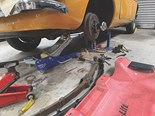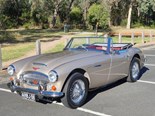BMW 1-series F20 Review
 BMW 1-series F20
BMW 1-series F20

 BMW 1-series F20
BMW 1-series F20


|
|
BMW 1-series F20
|

|
|
BMW 1-series F20
|
BMW 1-series. Upmarket Golf alternative

|
|
BMW 1-series F20
|
BMW 1-series F20
Immediately after flogging the crap out of BMW's new-generation F20 1-Series hatch through Victoria's splendid Yarra Ranges, an updated 123d coupe arrived in the office carpark. And talk about chalk and cheese. It's a well-known fact that ride quality has been a lost art for sub-luxo BMWs since the run-flat tyre appeared, but I wasn't prepared for the tragedy that is the 123d's pitchy, unsettled, brittle ride. Even the hardcore 1M rides more comfortably than a 123d.
The new-generation F20 1-series hatch, on the other hand, is dramatically different. Every F20 model gets adaptive damping (BMW calls it Driving Experience Control), and even in Sport mode, the 1-Series' ride is actually supple. Selecting Comfort doesn't make it a whole lot cushier either - just lighter and more aloof in the steering, with less disciplined yaw control in hard cornering. In fact, the new One is a much better-balanced car in Sport, with barely any detriment to ride quality. And that applies to cars wearing optional 245/35R18 run-flats as much as it does to the 118i/118d on standard-fit 205/50R17 Continental treads!
The F20 doesn't quite have the steering crispness or feel of the original hydraulic-steered E87 hatch, but it's a definite step-up from the electric-steered coupe. The standard chassis in Sport mode lets you push pretty hard without too much DSC intrusion (bizarrely, turning it off reverts the settings to Comfort) and a lot of that can be put down to the One's altered proportions. She's 85mm longer and 17mm wider, but the tracks are out by 51mm up front and a sizeable 72mm out back for a more planted feel and a tougher stance. The wheelbase has been stretched 30mm to achieve a much-needed 21mm increase in rear legroom, though you still have to feed your feet into the footwells to get in there. And despite improvements, you still don't get a lot of kneeroom or under-thigh support.
While the 118d's well-mannered 2.0-litre 105kW/320Nm turbodiesel four is essentially carried over (with a new eight-speed auto option and standard stop/start), the 118i's 1.6-litre turbo-petrol four is new, punching out 125kW at 4800rpm and 250Nm from 1500-4500rpm. Tied to an eight-speed auto (six-speed manuals weren't available at the launch), it has a traditional BMW sweetness to its delivery - up-shifting at 6600rpm in Drive with near-flawless precision. It's a lot torquier and sounds more interesting than the old 2.0-litre, yet BMW claims it averages just 5.9L/100km. Whether you think the new 1-Series looks any good is entirely up to personal taste.
But as an upmarket Golf alternative, this car has merit. It's cheaper, yet better-equipped and much classier than the old one. And even if its handling isn't quite as edgy, it's a far better all-rounder. It's also still rear-drive. In a class of bum-draggers, that counts.
SPECIFICATIONS
BMW 118i
ENGINE: 1598cc 4cyl, DOHC, 16v, turbocharger
POWER: 125kW @ 4800rpm
TORQUE: 250Nm @ 1500-4500rpm
WEIGHT: 1315kg
GEARBOX: 8-speed automatic
0-100KM/H: 7.5sec (claimed)
TOP SPEED: 222km/h (claimed)
PRICE: $45,495
Unique Cars magazine Value Guides
Sell your car for free right here
Get your monthly fix of news, reviews and stories on the greatest cars and minds in the automotive world.
Subscribe

.jpg)












.jpg)

